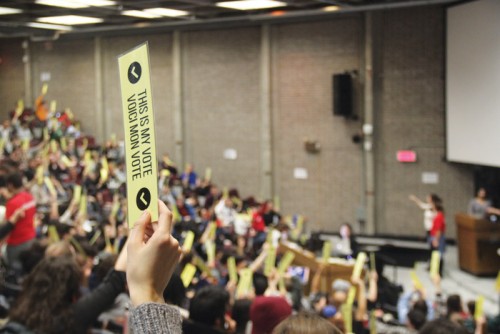Last Thursday, Nov. 26, the Students' Society of McGill University (SSMU) held a forum on restructuring the SSMU executive positions. It has been 10 years since the portfolios of executives were laid out in their current form; in that time, SSMU has grown such that these roles are no longer sustainable. This semester has been marred by the resignations of the vice-president (VP) Internal and the general manager, forcing SSMU to focus on internal operations, but restructuring the portfolios alone will only improve one aspect of the body. Given the inner turmoil of this year, now is the time for SSMU to reconsider the political aspect of its mandate in order to be a more focused political body. SSMU should be political insofar as it lobbies for student interests and mobilizes students; however, it should not allow the political mandate to stretch beyond its bounds as a representative body.
Without opening old wounds, it is time to reconsider the viability of SSMU as a political entity. Considerable amounts of work done by SSMU go unseen by the majority of the student body, but political controversy stirs anti-SSMU sentiments and disenchantment, ultimately attracting negative attention. When the "Motion Calling on SSMU to Stand in Solidarity with the People of the Occupied Palestinian Territories" was brought to the Fall 2014 GA, students were, (and many still are), confused about what actually transpired. Though the motion itself was postponed indefinitely, the whole proceeding left a bad taste in many students’ mouths.
When it comes to addressing issues that directly impact education, such as austerity and Fall reading week, SSMU’s role is invaluable. The vice-president (VP) External works to lead student protests and engage the student body in these concerns. SSMU should spend its time on the issues that it can have an impact on, such as provincial policy and McGill’s investments. It is not that the broader, international issues do not matter and do not warrant student attention; it is more so that SSMU is at its core a student union, and attempting to reflect the values of all students on such hot-button issues is an impossible task.
This year has seen relatively less controversy surrounding SSMU’s political positions. Its "Motion Regarding the Adoption of a Climate Change Policy" went by largely unnoticed, and no motions were brought to the Fall General Assembly (GA). GAs provide a forum for students to raise issues of concern, and then discuss and vote on them; the executives are not the final arbiters. Nevertheless, SSMU can be more selective, and must be sure to focus on issues that it has an impact on. Student activists are a cornerstone of the university experience, but expressing perspectives through the SSMU is not successful unless it is rooted in the McGill experience. Stances that SSMU has taken—which are distinct from what students vote on in a GA—against austerity and in favour of divestment are appropriate because they focus inwards and on issues that directly impact student life.
With the recent election of Omar El-Sharawy as the new Vice-President (VP) Internal, the potential for SSMU to expand its engagement with students can be realized. Such efforts must not only focus on what was left undone by the vacancy in the position earlier this Fall, but also work with students to address loose ends. The political mandate is certainly one of those; communicating the options that are available in terms of restructuring SSMU, including its mandate, will be essential.
Students do not need SSMU to express political perspectives, and SSMU should not be a microphone for any perspective—there is too much potential for disaffection. Restructuring SSMU must be accompanied by a reevaluation of what defines SSMU as a representative body.








